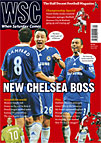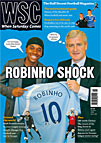 Dear WSC
Dear WSC
Bruce Wilkinson (WSC 267) pointed out that ticket queues “seem a quaint ritual of a bygone age”. Waiting in a virtual internet queue bears no similarity to lining up outside the box office. I have my tickets for the FA Cup final, but I do not feel as if I earned them. Instead of getting up in the middle of the night, crossing London, losing half a day’s work, standing in the rain shuffling forward inch by inch while nervous that there are too many punters and too few tickets, I merely sat in my dressing-gown in front the PC. There is no one to talk to in the “virtual waiting room”. Your opportunity is allotted randomly. Suddenly it’s all over and you have what you came for. One should be happier as the process is simple and efficient and the desired result achieved, but somehow it feels like a hollow victory as it lacks the sense of accomplishment joy and triumph of the old-fashioned process. You can’t even wave the tickets in triumph above your head as they are sent by post.Obviously my complaining about the changes that actually improve my life marks me down as “old”. I am not asking to bring back rickets and polio and to repeal the Factory Acts but I do miss a modicum of discomfort and inconvenience. The old experience was akin to standing on the terraces or being subject to the over-zealous policing that used to mark us out as a tribe. Under the new regime the tickets are yours if your broadband speed is faster and your credit card more golden than the next, rather than if you have more commitment stamina and perseverance.Will the ultimate progress be when we treat football like theatre and opera by dressing-up smartly for the occasion and ordering our interval drinks? Or is that Club Wembley?
Patrick Sheehy, London
Search: ' Lex Gold'
Stories
 Dear WSC
Dear WSC
The letter about spectators leaving games early (WSC 265) reminded me of a father and son who were regulars in the Enclosure at Fulham in the 1980s. They were quite an unappealing pair generally, prone to loud and unfunny abuse of both sets of players and especially of the match officials. The father would often attempt to get a slow handclap going when there was a stoppage in play. Without fail they would leave several minutes before the end of game, even if Fulham were on the attack and pressing for an equaliser or, more often, grimly hanging on for a draw. They’d always look immensely pleased with themselves as they edged along the terrace, as though beating the post-match rush was a major victory. They stopped appearing at games eventually so it must have occurred to them that the only guaranteed way to avoid getting stuck in traffic would be to not leave the house at all.
Rob Henderson, Cirencester
 Dear WSC
Dear WSC
I write to you concerning Simon Creasey’s fascinating article Parting Shots (WSC 259), in which Ignacio Palacios-Huerta of the London School of Economics describes that, in penalty shootouts, the team that taking a penalty first wins 60.5 per cent of the time. He then goes on to say that the team kicking first “has a 21 per cent greater probability of winning the shootout”. I don’t cast doubt on Mr Palacios-Huerta’s abilities as a statistician, but it is possible that he meant 21 per cent more probability of winning. If Team X has a 60.5 per cent probability of winning, then Team Y therefore has a 39.5 per cent probability. Team X’s probability is [(((60.5 / 39.5) -1) x 100) =] 53 per cent greater than Team Y’s of winning the shootout. Or, in other words, that Team X wins 21 per cent more matches means that their chances are 53 per cent better than Team Y’s for any given shootout. We can be sure that this is precisely what was going through Rio Ferdinand’s head after extra time in Moscow.
Patrick Finch, Eskilstuna, Sweden
 Al Needham remembers Jimmy Sirrel, Nottingham’s second most famous football manager, who died last month
Al Needham remembers Jimmy Sirrel, Nottingham’s second most famous football manager, who died last month
It’s very easy to see Jimmy Sirrel, who died on September 25 at the age of 86, as someone who worked in the shadow of Brian Clough; a decent enough manager who did his best with extremely limited resources, but could only look on while his neighbour on the other side of the Trent took the glory. That is not the case at all. Sirrel was just as important to the ’Pies as Clough was to the Garibaldis.
 The campaign for respect for referees is targeted at managers and players, but, Michael Whalley wonders, wouldn’t it be better directed at broadcasters such as Andy Gray and Eamonn Holmes?
The campaign for respect for referees is targeted at managers and players, but, Michael Whalley wonders, wouldn’t it be better directed at broadcasters such as Andy Gray and Eamonn Holmes?
Sky Sports News – the channel that only considers sporting events to be truly newsworthy if they have the rights to show them – was a bit stuck during the Olympics. But on the day American swimmer Michael Phelps won a record-equalling ninth gold medal, it cleared its afternoon schedules – so that Eamonn Holmes could talk to John Terry about respecting referees.